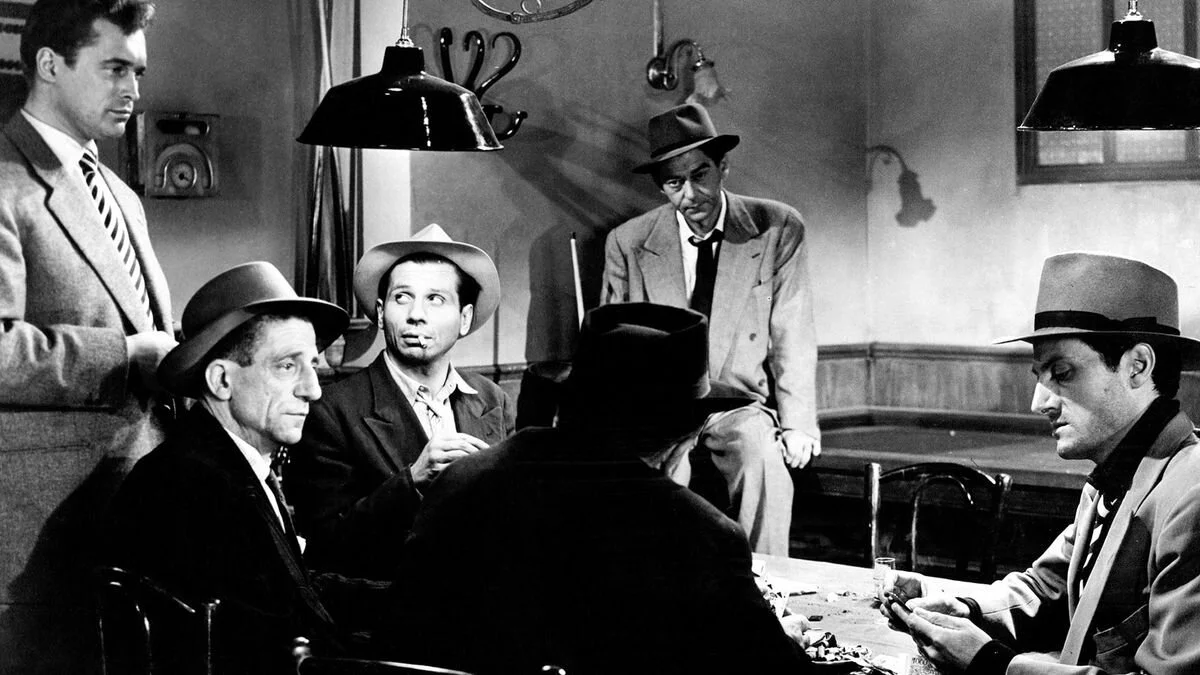FILM 2101: RIFIFI (1955)
FILM 2101: RIFIFI (1955)
Four men plan a technically perfect crime, but the human element intervenes...
TRIVIA: The much imitated heist sequence is over 32 minutes long and contains not a single line of dialogue or music. The production crew and composer Georges Auric thought it would be a disaster to have such a long sequence sans dialogue. Auric insisted that he allow him to write a grand piece of music for the scene and he eventually did on his own. Later Dassin played the part for Auric twice, once with the score, once without. Auric turned to him and admitted, "Without the music".
Mexican authorities pulled the movie from theaters after multiple burglaries were committed employing methods similar to those shown.
The argot French slang word, "Rififi" is defined loosely as trouble/violent conflict/a brutal show of force, usually in reference to chest puffing and macho tough guy posturing by thugs and criminal element of Paris.
Dassin claims his reasoning for the lengthy silence was realism. He explains that this also reinforces their astonishing teamwork under stress and that these men can, and carry these tasks out with no need for words. They work in a state of complete silence where any sound (like Jo bumping the piano) was their mortal enemy. Note that Cesar wears ballet slippers during the heist.
The film was made on an extremely small budget (so small that Dassin claims people do not believe him when he tells them the amount), which is why so many desperate (himself included) or inexperienced people were hired for the production. The director claims that he was so broke at the Cannes film festival in 1955 (where he won the Best Director prize for the film) that, while watching one of the producers play the casinos, he had to ask for some money to bet. He then asked on what date had they began filming Rififi? When informed of the date (the 18th), Dassin put all his money on 18 and won. He says that his family managed to live off this money for a while.
Writer/director Jules Dassin portrayed Cesar only because the actor that was hired encountered contract problems just prior to filming.
The argot slang that the novel was written in was incomprehensible to writer/director Jules Dassin, so much so that he had to have his agent who suggested it, read it to him. The producer initially refused because he had been courting a woman for some time and had "plans" that night. Dassin told him that he'd lost his woman and that he had to come over and read it to him (which he did). When he finally understood the story he claims that he was "shocked" by its content (the story involves necrophilia, amongst other things) and was prepared to tell Henri Bérard that he didn't want to do the film. What changed his mind was his blacklist-induced poverty. He then cut Auguste Le Breton's novel down to a story of a heist (which was only a small element of the actual story). Le Breton was infuriated and came to Dassin and asked, "Where is my book?". Dassin explained the situation to him, but Le Breton ignored him and simply repeated "Where is my book?" until eventually drawing a pistol and placing it on the table as a threat. Dassin claims that the threat of violence over such a matter and the appearance of Le Breton was so ridiculous that he simply broke out with laughter. Le Breton then laughed and the two got along fine, despite the disagreement.
Dassin, aiming for a dark and gloomy film with deep greys as the lightest it would get, refused to film on beautiful sunny days. This supposedly caused much frustration amongst the producers, no doubt because of the prolonged shoot which they saw as unnecessary.
For the scene where Jo and Mario inform Tony of their intent to "knock over" the Mappin & Webb, the crew placed a table and three chairs in front of a phony window frame in the middle of the street to create the illusion that they were sitting in a cafe across the street from the jewelers.
This film is part of the Criterion Collection, spine #115.
The film is included on Roger Ebert's "Great Movies" list.
Watch this here…













